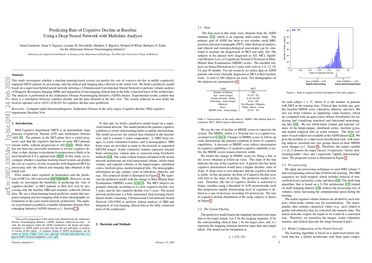Predicting Rate of Cognitive Decline at Baseline Using a Deep Neural Network with Multidata Analysis
Purpose: This study investigates whether a machine-learning-based system can predict the rate of cognitive decline in mildly cognitively impaired patients by processing only the clinical and imaging data collected at the initial visit. Approach: We built a predictive model based on a supervised hybrid neural network utilizing a 3-Dimensional Convolutional Neural Network to perform volume analysis of Magnetic Resonance Imaging and integration of non-imaging clinical data at the fully connected layer of the architecture. The experiments are conducted on the Alzheimers Disease Neuroimaging Initiative dataset. Results: Experimental results confirm that there is a correlation between cognitive decline and the data obtained at the first visit. The system achieved an area under the receiver operator curve (AUC) of 0.70 for cognitive decline class prediction. Conclusion: To our knowledge, this is the first study that predicts slowly deteriorating/stable or rapidly deteriorating classes by processing routinely collected baseline clinical and demographic data (Baseline MRI, Baseline MMSE, Scalar Volumetric data, Age, Gender, Education, Ethnicity, and Race). The training data is built based on MMSE-rate values. Unlike the studies in the literature that focus on predicting Mild Cognitive Impairment-to-Alzheimer`s disease conversion and disease classification, we approach the problem as an early prediction of cognitive decline rate in MCI patients.
PDF Abstract